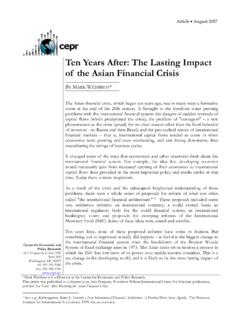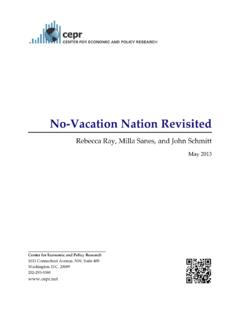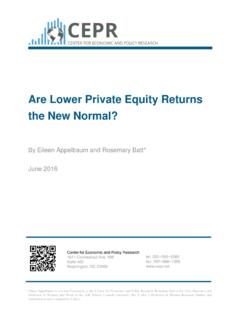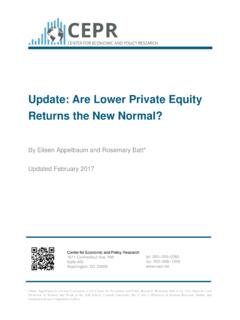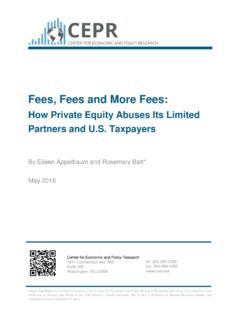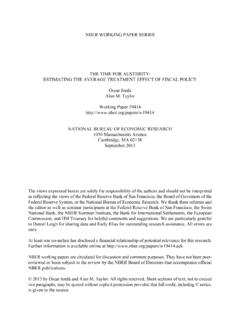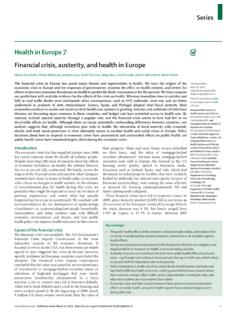Transcription of Partners in Austerity - cepr.net
1 April 2015 Jake Johnston is a Research Associate at the Center for Economic and Policy Research, in Washington Partners in Austerity : Jamaica, the United States and the International Monetary Fund By Jake Johnston* Center for Economic and Policy Research 1611 Connecticut Ave. NW Suite 400 Washington, DC 20009 tel: 202-293-5380 fax: 202-588-1356 Acknowledgements The author would like to thank Mark Weisbrot, Dan Beeton, and Eileen O Grady for editorial assistance. Contents Contents .. 2 Executive Summary .. 1 Introduction .. 2 Long-Term Growth Failure and Recent Developments .. 3 IMF-Supported Austerity .
2 6 Debt Relief and the Role of the Multilaterals .. 11 Conclusion .. 14 References .. 15 Partners in Austerity : Jamaica, the United States and the International Monetary Fund 1 Executive Summary This paper looks at Jamaica s ongoing relationship with the International Monetary Fund (IMF) and other multilateral development banks, its recent economic performance, and the impact on development of a persistently high debt burden. It finds that after 20 years of negative average annual per capita GDP growth, Jamaica continues to be plagued by high debt and low growth. Now in the third year of an IMF-backed economic program, Jamaica is running the most austere budget in the world, with a primary surplus of percent.
3 This is enormous; even Greece, which is facing a tense standoff with the IMF and European authorities over its debt, is only expected to run a primary surplus of percent of GDP this year and percent for years thereafter and this is widely considered politically unsustainable. After three consecutive quarters of economic growth, Jamaica s GDP fell by percent in the third quarter of 2014. The economy remains smaller today than it was in 2008. With anemic growth and continued Austerity , social indicators have drastically worsened, with poverty doubling since 2007. Unemployment, at percent, remains higher today than during the height of the global recession.
4 After two debt restructurings, both as preconditions to receiving IMF support, Jamaica still has a debt-to-GDP ratio of nearly 140 percent. Interest payments, while reduced from their peak in FY 2009/10, remain among the highest in the world at over 8 percent of GDP last year. Coupled with the IMF-backed Austerity , the high interest payments have all but crowded out needed capital spending. After averaging about 4 percent of GDP over the five years prior to the IMF agreement, government capital expenditure reached a low of percent of GDP in FY 2014/15. After having multilateral loans cut off in 2012 following the breakdown of Jamaica s previous IMF agreement, net flows from the multilateral banks turned negative for two consecutive years.
5 Even after the signing of the new IMF agreement, Jamaica paid $138 million more to the IMF than it received last year. Jamaica still owes the World Bank and Inter-American Development Bank over $650 million through 2018. This paper finds that multilateral debt relief would likely free up more resources than continuing to issue further loans. Finally, the paper finds that without hundreds of millions in financial support from Venezuela and China the impact of IMF-led Austerity would likely be far worse and, ultimately, politically untenable. Partners in Austerity : Jamaica, the United States and the International Monetary Fund 2 Introduction On April 9, President Barack Obama will travel to Jamaica for a series of bilateral and multilateral meetings.
6 Obama will become only the second sitting United States president to visit the island nation. Jamaica actually has a lower per-capita GDP in 2015 than when Obama was elected more than six years ago. Though Jamaica will be the site of a meeting of heads of state from the Caribbean Community (CARICOM), the visit will also certainly touch on Jamaica s ongoing International Monetary Fund (IMF) agreement. Jamaica is now entering the third year of the agreement, the signing of which was a priority for the current Jamaican government upon taking office in 2012. The 2013 agreement with the IMF came two years after Jamaica s previous agreement stalled when the government agreed to pay promised wage increases to public sector employees against the IMF s The basic framework of the new agreement is remarkably similar to that of the previous one.
7 As a prior condition to receiving the 2010 IMF loan, Jamaica undertook a debt exchange (known as the JDX, or Jamaica Debt Exchange) which aimed to lower the interest burden and lengthen the maturity profile of the government s outstanding debt. The economic platform involved significant fiscal consolidation, based on wage freezes, reduced expenditure and increased revenues. For the more recent loan, Jamaica once again undertook a debt exchange (this one termed the NDX, or National Debt Exchange) and has committed to years of extremely austere fiscal policy. When the previous IMF agreement went offtrack in 2011, funding from other international Partners also all but dried up.
8 The 2013 agreement, together with funding from the World Bank and Inter-American Development Bank (IDB), aimed to give Jamaica access to some $2 billion dollars of loans over the four-year life of the program. Crippled with devastatingly high debt levels and anemic growth for years, Jamaica is certainly in need of financing. But it is also the case that, after billions of dollars of previous World Bank, IDB and IMF loans, much of its debt is actually owed to the very same institutions that are now offering new The United States, as the largest voting member within the IMF, played a key role in securing the new agreement between the IMF and Jamaica.
9 In 2014, IMF Managing Director Christine Lagarde told reporters that while she had been told how difficult the situation was in Jamaica, she didn t know there would be international pressure coming from [Capitol] Hill. Lagarde added, a group of Congress women and one man who came unannounced, sat in my office and said to me you 1 Johnston and Montecino (2012). 2 Johnston (2013). Partners in Austerity : Jamaica, the United States and the International Monetary Fund 3 have got to help Jamaica. 3 This was confirmed in March when Jamaica s Prime Minister Portia Simpson-Miller, speaking during a budget debate at the House of Representatives, thanked the Congressional Black Caucus who, upon learning of the challenges we were immediately began to lobby the IMF on Jamaica s behalf.
10 4 Jamaica s finance minister, Dr. Peter Phillips, cited the country s good performance under the IMF agreement as the reason for Obama s trip, which follows those of Lagarde and IDB President Luis Alberto Moreno. For Dr. Phillips, the credibility gained from the IMF agreement is why we are on the itinerary of President Barack Obama. 5 The Jamaican press has also put forth another reason for the president s visit: as a sign to the rest of the region. Jamaica, which has a long history of high debt and low growth, is not unique among its neighbors. These problems continue to plague many other Caribbean nations, yet few have been as willing to swallow the bitter Austerity pill as Jamaica has been.

